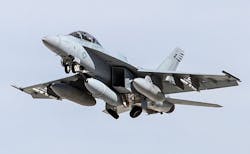Lockheed Martin awarded $108 million for IRST21 sensor system
"We are continuing a long legacy of delivering unmatched sensor technologies to our customers around the globe," said Michael Williamson, vice president of Sensors & Global Sustainment at Lockheed Martin Missiles and Fire Control. "The IRST21 sensor system provides U.S. Navy F/A-18E/F operators with superior detection and survivability capabilities." The IRST21 sensor system uses state of the art infrared search and track technology to passively detect and track airborne threats in radar-denied environments. Contributing to both the U.S. Navy and U.S. Air Force, IRST21 will deliver a critical warfighting capability to meet any threat and directly support U.S. Combatant Commanders' operational demands. Currently, IRST21 is mounted in the nose of the F/A-18E/F's centerline fuel tank and in Legion Pod® for other fighter and on-fighter platforms.
Lockheed Martin's IRST sensor system is in full rate production and has logged more than 300,000 flight hours on the U.S. Navy's F-14 and F/A-18E/F, international F-15 platforms, and the U.S. Air Force's F-15C and F-16. For additional information, visit their website: their website.
Learn more: search the Aerospace & Defense Buyer's Guide for companies, new products, press releases, and videos
